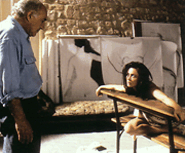On a lazy summer afternoon at a courtyard café of a provincial hotel, a lone, pensive artist named Nicolas (David Bursztein) abstractly observes a pair of English tourists and rough sketches them onto his journal before being distracted by the mechanical whirring of an actuated instant camera from an overlooking balcony. The surreptitious photographer is revealed to be Marianne (Emmanuelle Béart) who ostensibly complies with Nicolas’ request to discuss in person the terms for which she would be willing to relinquish the presumably incriminating photograph – a playful verbal sparring that, not surprisingly, takes on an immediate sexual overtone as the two hurriedly make their way to an upstairs room on the pretense of finalizing their dubious transaction. The mysterious – and overtly unseemly – public display is soon revealed to be a role-playing game staged by the young couple, perhaps out of boredom and restlessness in the bucolic village, as Nicolas awaits the opportunity to meet with a renowned, semi-retired artist named Edouard Frenhofer (Michel Piccoli) through their mutual acquaintance, an art collector and gallery owner named Porbus (Gilles Arbona) before the couple’s trip comes to an end. Ten years earlier, the reclusive Frenhofer decided to abandon an ambitious study entitled La Belle Noiseuse, inspired by the Balzac heroine – a courtesan named Catherine Lescaut – after the profound intimacy involved in the project – a self-described artistic quest to “go further” and intrinsically capture and give form to the model’s ephemeral essence on canvas – began to expose the fragile vulnerability of his relationship with his wife and muse Liz (Jane Birkin) that would nearly ruin their marriage. Now goaded by Porbus to resume the ill-fated project (who offers to buy the painting upon completion sight unseen) with a different (and perhaps more importantly, less emotionally invested) model, the aging Frenhofer begins to express his reluctance and self-doubt in undertaking such a demanding task, a trepidation that the reverent and well-intentioned Nicolas attempts to assuage by offering to have Marianne pose for him. It is an impulsive and presumptuous act that soon begins to betray fissures in the young lovers’ relationship as well, as their seeming carefree bohemian existence strains under the weight of Marianne’s resentful acquiescence, Nicolas’ passivity, and Frenhofer’s consuming obsession to create a final masterpiece.
Loosely adapted from Honoré de Balzac’s The Hidden Masterpiece, La Belle noiseuse is an elegantly realized, exquisitely tactile, understated, and deliberative exposition on the complex mutualism and turbulent process of artistic creation. From the lyrical opening sequence of Nicolas and Marianne’s staged seduction, Jacques Rivette uses his distinctive, recurring narrative device of performance within a performance in order to illustrate the film’s theme, not only of the social propensity to create insulating (and protective), emotional adaptation through masquerade and façades, but also the revelatory nature of art that results from passion, diligence, focus, sacrifice, and abandonment of fear and inhibition. Evoking both the assiduous self-discipline of manual ritual in Robert Bresson’s cinema and the methodical rigor of Spanish artist Antonio Lopez Garcia in Victor Erice’s contemporary film The Quince Tree Sun, Rivette eschews the stereotypical characterization of the volatile artist by incorporating real-time illustration of figure sketches and composition studies that reflect the artist’s deliberate methodology: the systematic deconstruction, re-assimilation, and translation of the physical form (note the filmmaker’s use of narrative linearity and extended pacing to simulate logical diurnal progression). In the end, it is through Frenhofer’s thoughtful and disciplined struggle that he creates an inspired and deeply personal work of maturity and illumination – a renewed raison d’être that emerges from a humble acceptance of passage, an abandonment of persona, and a restoration of human identity.
© Acquarello 2004. All rights reserved.
